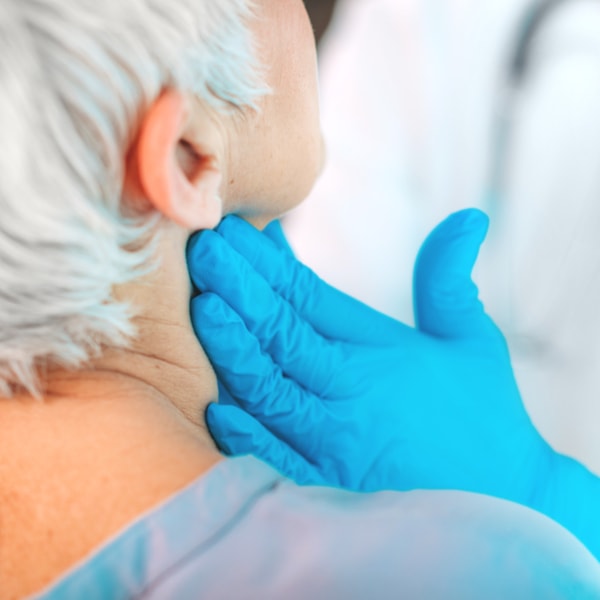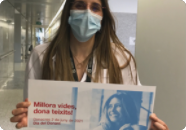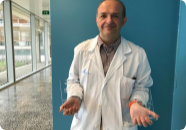- Home
- Citizenship
- Clinical specialties and services
- Hospital de Sant Joan Despí, Hospital General de l'Hospitalet, CAE Cornella, CAE Sant Feliu, CAE Ronda la Torrassa
- Endocrinology and Nutrition
Hospital de Sant Joan Despí, Hospital General de l'Hospitalet, CAE Cornella, CAE Sant Feliu, CAE Ronda la Torrassa
Endocrinology and Nutrition
- Endocrinology and Nutrition
- Team
- Units and benefits
- Diseases and procedures
- Research
- Teaching activity
- Related information
Endocrinology and Nutrition
The Endocrinology and Nutrition Service covers diseases related to the endocrine glands and those related to nutrition. He shares this dual activity both in the Hospital and in outpatient clinics. For its work, it needs a very good collaboration with the primary care centers.
Serves the population from the age of 15.
The service divides the activity between hospitalization, hospital outpatient consultations, the day hospital and specialized assistance offices.
-
Update date: 01.01.2024
-
-
Head of Service

-
Maria Merce Albareda Riera
endocrinology hsjd
Head of Service
-
Aida Palmira Vasquez Iñiguez
nutrition unit
dietitian-nutritionist
-
Amaya Peñalva Arigita
nutrition unit
dietitian-nutritionist
-
Anna Sansano Alguero
nutrition unit
dietitian-nutritionist
-
Carmen Asensio Ortega
hgh endocrinology
service coordinator doctor
-
Maria Lecha Benet
nutrition unit (validation level)
dietitian-nutritionist
-
Mercedes Lara Campos
external inquiries from hsjd
clinical nurse
-
Paula Garcia Sancho De la Jordana
endocrinology hsjd
specialist doctor
-
Christian Munne Diaz
diabetes education
nurse
-

Beatriz Suero Suñe
external inquiries
nurse
-
Gemma Francisco Exposito
hgh endocrinology
specialist doctor
-

Irela Lopez Cobo
endocrinology hsjd
specialist doctor
-

Jessica Alexandra Guzman Bridges
external inquiries from hsjd
nurse
-
Jose Antonio Mestron Perez
endocrinology hsjd
specialist doctor
-
Nara Daifuku Sansano
external inquiries
nurse
-
Nuria Regincos Giner
external inquiries di hgh
nurse
-

Pedro Alejandro Gil Millan
endocrinology hsjd
specialist doctor
-
Maria Rosa Prats Farreras
nutrition unit
dietitian-nutritionist
-
Sara Torrejon Jaramillo
endocrinology hsjd
specialist doctor
-
Silvia Martin Grillo
endocrinology hsjd
specialist doctor
-
Susan Reig Gazquez
diabetes education
nurse
-
Yolanda Torres Muñoz
endocrinology hsjd
specialist doctor
-
Manuel Luis Sahun De la Vega
endocrinology hsjd
specialist doctor
-

Maria Mar Torreño Sanchez
external inquiries
nurse
-
Carmen Durban Izquierdo
external inquiries
nurse
-
Cristina Lopez Muzas
external inquiries
nurse
-
Raquel Claudio Yago
external inquiries
nurse
-
Irene Noelia Berges Raso
endocrinology hsjd
specialist doctor
In this section appear the professionals of the Integral Health Consortium who have authorized the display of their personal data.
-
Update date: 01.01.2024
-
-
Units and benefits
Pathologies treated by the service
diabetes
- Type 1 diabetes. Monographic consultation and team work (doctor / nurse educator). Control of patients carrying insulin pumps, glucose sensors and closed handle systems.
- Type 2 diabetes. Care for the multicomplicated patient and/or with acute or chronic decompensation.
- diabetic foot Participates in a multidisciplinary unit.
Endocrinopathies and pregnancy. Monographic consultation and team work (doctor/nurse educator). Coordinated with the Gynecology and Obstetrics Services of Hospital General de l'Hospitalet and Hospital de Sant Joan de Déu:
- gestational diabetes
- Pregestational diabetes.
- Thyroid pathology and pregnancy.
- Obesity and pregnancy
- Other endocrine diseases and pregnancy
Thyroid
- hyperthyroidism Diagnosis and treatment
- hypothyroidism Diagnosis and treatment
- Thyroid cancer. Monographic consultation and in-hospital multidisciplinary committee to assess cases. Participation in the Interhospital Advanced Thyroid Carcinoma Committee.
- Thyroid nodule. High-resolution monographic consultation with ultrasound diagnosis, and fine-needle puncture and follow-up. Alcoholization of thyroid nodules.
- Thyroid ophthalmopathy. Multidisciplinary committee that makes decisions about treatment and follow-up.
Parathyroid
- Hyperparathyroidism and hypoparathyroidism. Diagnosis and treatment. Multidisciplinary committee to evaluate cases.
adrenal glands
- Adrenal dysfunctions / tumors. Diagnosis and treatment. Multidisciplinary committee to evaluate cases
hypophysis
- Pituitary diseases (dysfunctions, adenomas). Monographic consultation for diagnosis and medical treatment.
Gonadal pathology
- Hypogonadism / Gynecomastia. Diagnosis and treatment
Neuroendocrine tumors
Cardiovascular risk
- Dyslipidemia / Patients with high cardiovascular risk / Secondary prevention / Secondary hypertension / Hyperaldosteronism. Consultation for clinical and genetic diagnosis, and treatment. Framed within the Integrated Cardiovascular Risk Area, a transversal body in which different hospital services participate.
Care for patients with oncological and hematological diseases
- Diabetes: decompensations associated with oncological/haematological treatment in patients with previous diabetes, newly diagnosed diabetes secondary to the treatments.
- Endocrine diseases associated with oncological treatment.
- Malnutrition and malnutrition risk. Diagnosis and nutritional support
- Impossibility of oral nutrition (stroke, neoplasms, digestive surgery, among others). Support with artificial nutrition (nasogastric, nasojejunal, gastric tube), percutaneous endoscopic gastrostomy (PEG), jejunostomy (JEG or surgical). Peripheral parenteral nutrition and total parenteral nutrition in hospitalized patients.
- Comprehensive nutritional support program for oncology patients
- Diet therapy and nutritional advice: pathologies that require dietary treatment such as food allergies, chronic renal failure (CRF), congestive heart failure (CHF), obesity, inflammatory bowel disease
- Perioperative nutritional support within multimodal rehabilitation
- Dysphagia Assessment (if necessary volume-viscosity test) and prescription of adapted diet and thickener modules
- Dietary and nutritional support and education for complex chronic patients with the use of a Telemedicine tool.
- Support for the Socio-Sanitary Hospital: Support and collaboration in the management of the risk of malnutrition and malnutrition. Impossibility of oral nutrition. Collaboration in the treatment of Dysphagia (adaptation of diets and thickening prescription if necessary at discharge).
- Home Enteral Nutrition: management and monitoring of the program for patients with enteral nutrition at home or in nursing homes.
In this unit, care and therapeutic education is provided to people with the following pathologies:
- diabetes
- gestational diabetes
- Obesity and gestational desire or pregnancy i
- Obesity degree I and II
Multidisciplinary unit to address obesity with complications and/or morbid diagnosis and dietary, pharmacological and surgical treatment.
The service focuses its activity in four areas:
- Hospitalization This is a service that admits very few patients. Instead, it supports the Emergency Service and other hospital services to monitor admitted patients. Above all, it monitors patients with decompensated diabetes and provides nutritional support to malnourished patients or those at risk of malnutrition.
- External hospital consultation. Currently the first visits and visits that require scans are carried out in person, the second visits can be carried out in person or virtually (video or telephone consultation). We handle cases of high complexity, so we have:
- General endocrinology consultations
- Monographic inquiries from:
- Type 1 diabetes / Monogenic diabetes / Secondary diabetes
- Endocrine pathology of pregnancy
- Diabetes education
- Thyroid cancer
- Thyroid nodule (high-resolution consultation: diagnosis with ultrasonography-fine needle aspiration (FNA))
- hypophysis
- nutrition obesity
- Dietetics: Obesity (group and individual follow-up consultations), Oncology, pre- and post-surgical nutritional assessment, General Dietetics, virtual NED (assessments requested by Primary School)
- Cardiovascular risk (within the Integrated Cardiovascular Risk Area)
- Patients with oncological pathology and diabetes or endocrine diseases.
- Control of enteral nutrition at home.
- Multidisciplinary diabetic foot unit (jointly with Podiatry and the Vascular Surgery, Traumatology and Internal Medicine Services).
- day hospital The service treats patients with decompensation of their pathology who need more intensive and/or preferential/urgent care. Thanks to the high resolvability of this device, there have been almost no admissions in conventional hospitalization in recent years. Primary care has direct access, via telephone, to refer patients with severe decompensation from their endocrine pathology, as well as the Emergency Department and other hospital services. The pathologies treated at the day hospital are:
- Type 1 diabetes onsets and new type 2 diabetes diagnoses (endocrinologist, nurse educator and day hospital nurse working as a team).
- Diabetes with chronic decompensation requiring insulinization (teamwork between the endocrinologist and the nurse educator).
- Diabetes with acute decompensation such as simple hyperglycemia, mild ketosis or ketoacidosis (teamwork between the endocrinologist and the nurse educator).
- Other endocrine pathologies that require more careful control or urgent/preferred treatment (initial hyperthyroidism or difficult to control, hyponatremia, hypocalcemia, hypomagnesemia).
- Dietary and nutritional monitoring of cancer patients (dietitian-nutritionist).
- Assessment and follow-up of oncological patients with diabetes (doctor/nurse educator team work).
- Evaluation of oncological patients with endocrine diseases.
- The following activities are also carried out:
- Endocrine functional tests (day hospital doctor-nurse team).
- SNG placement, NE initiations and NED education (day hospital nursing team, Nutrition nurse, dietitian-nutritionist, physician).
- Spare parts for nasogastric feeding tubes and PEG (day hospital nursing team, Nutrition nurse, dietitian-nutritionist, doctor).
- Treatment and care for tube complications (SNG, PEG, Jejunostomies)
- Treatment of Graves' oculopathy with intravenous cortisone pulses (day hospital doctor-nurse team).
- Start of treatment with subcutaneous insulin perfusors and closed loop systems
- Alcoholization of thyroid nodules.
- Specialized assistance consultancies (CAE).
- The service has four of these offices: one in Sant Feliu de Llobregat, one in La Torrassa and two in Cornellà.
- A significant proportion of patients referred from primary care are assisted in the CAEs
- Functional diabetes education nursing unit. Provides diabetes education services in the three CAEs.
- Group psychological support for patients with type 1 diabetes, coordinated by the psychologist Javier Tinoco and the diabetes education nurses.
- Multidisciplinary support for obese patients in the bariatric surgery study circuit (Psychologist, endocrine, nursing).
- The Endocrinology and Nutrition Service actively participates in: the Integrated Cardiovascular Risk Area, the multidisciplinary team of the Diabetic Foot Unit, the Thyroid Tumors Committee and the Graves Oculopathy Committee
- The Nutrition and Dietetics Unit participates in the following commissions/committees: Nutrition, Dysphagia, Obstructive Sleep Apnea Syndrome (OSAS), General Oncology and Surgical Oncology, Obesity and Bariatric Surgery, Complex Chronic Patient, Kitchen.
- The Nutrition and Dietetics Unit monitors more than 1000 patients at home with enteral nutrition
- Joint monthly consultation of the Sant Joan de Déu Hospital Obstetrics Service and the Endocrinology Service of our complex at the Sant Joan de Déu Hospital in which pregnant women with complex endocrinological pathology are assessed.
The Endocrinology and Nutrition Service considers the relationship and coordination with primary care to be very important. Communication is carried out through the following channels:
- Virtual consultation. The main axis of communication (consultations, first visits, preferences) as it allows great agility in the management of the patients consulted, even during holiday periods.
- Face-to-face or online consultation (Teams). It is monthly in most outpatient clinics (in some cases bimonthly). Each outpatient clinic has its referring endocrinologist. This allows for direct contact between professionals, strengthens trust and clears up doubts in problematic cases. It is also used for updating current affairs.
- Day hospital telephone. It allows direct contact for the referral of patients who require care with relative urgency.
- Endocrinology email: for personalized consultations of family doctors with their consultant or with the specialist of a monographic consultation, by other specialists and by patients.
- Nutrition Email: mainly for the management of patients with enteral nutrition at home.
- Diabetes Education Email: for patients and primary care case managers.
- Diabetes education telephone number: Telephone support for patients and case managers.
- Diabetic foot email (multidisciplinary unit): for the rapid management of patients with diabetic foot.
Since 2012 the diabetes route, which provides for the referral criteria and communication channels between primary care and the Endocrinology and Nutrition Service. This route was reviewed at the end of 2014 and in 2016, specifically that of the Hospitalet Nord area.
- Sexual and Reproductive Health Centers (ASSIRS): quarterly meetings.
- Gynecology and Obstetrics Service of the Hospital General de l'Hospitalet: quarterly meetings.
- General Surgery Service: joint sessions of thyroid, parathyroid and adrenal pathology.
- Gynecology and Obstetrics Service: monthly Obstetrics-Endocrinology joint visits at Sant Joan de Déu Hospital.
- Ophthalmology Service: thyroid ophthalmopathy multidisciplinary committee.
- The hospital has an integrated capillary blood glucose control system for admitted patients that avoids errors (from the direct glucometer to the SAP prior to barcode control)
- The service monitors around 900 patients with type 1 diabetes using the latest technologies:
- insulin pump
- Insulin pump with integrated sensor. Hybrid systems.
- Management of glucosensors
- "Online" control platforms
- It offers a high-resolution examination of the thyroid nodule. In the same visit, an ultrasound and an ultrasound-guided puncture of the nodule can be performed, in addition to the treatment of the thyroid nodule with alcohol.
- Monitors more than 1000 patients with enteral nutrition at home (nutritional support, thickeners, nasogastric tube feedings, gastric tube or PEG feedings).
- The Endocrinology Day Hospital is open for primary care, emergency rooms and urgent patient consultations.
- It has a Multidisciplinary Diabetic Foot Unit.
- There is easy communication between primary care and the service (face-to-face consultation, virtual agendas, e-endocrine mail from the Nutrition Unit, doctor, clinical nurse and dietitian-nutritionist telephone numbers).
- The Functional Unit of Obesity and Bariatric Surgery with an almost complete abortion of the patient with Obesity.
- The consultation of patients with oncological and hematological diseases that allows a multidisciplinary assessment doctor-nurse educator and dietitian-nutritionist.
- The coordinated care of pregnant women with endocrine pathology with the ASSIRs and the Gynecology and Obstetrics Services of our area of influence.
-
Update date: 01.01.2024
-
-
Diseases and procedures
-
diabetes
Diabetes is a disease that affects 13% of the population, although a third do not know they have it. There are two types of diabetes: type 1 and type 2.
- La type 1 diabetes it is much less common than type 2 and usually starts before the age of 40, but it can also affect older people. The disease consists of a lack of insulin production by the pancreas when it has been damaged by an autoimmune attack, that is to say by an attack by the person's own defenses, which by mistake have destroyed the cells that produce insulin. So it is diagnosed that insulin treatment is needed. Much progress has been made in insulin injection and glycemic control systems, which has greatly facilitated and improved the control of diabetes and the quality of life of patients.
- La type 2 diabetes it usually appears after the age of 40 and is closely related to obesity, although it also has a certain hereditary component. Although the pancreas produces insulin, it is not effective enough and treatment with non-insulin drugs (pills or injections) is required, which contribute to lowering or normalizing the levels of glycemia (glucose in the blood). In diabetes it is always very important to know food well and to take great care of the type of food. The vast majority of people with type 2 diabetes are also obese, and losing weight helps improve control. Poorly controlled diabetes over the years can generate a whole series of complications. Tobacco, cholesterol and hypertension increase the risk of some complications, so it is very important to control both cholesterol and hypertension, and to quit smoking
The new technologies have contributed significantly to the improvement of diabetes control.
- Continuous subcutaneous insulin pumps (insulin pumps)
- Glucose sensors
- Closed handle systems
- Data management apps and platforms.
- Diabetes information search engines (websites, apps, blogs)
- Patient associations are very useful when you suffer from a chronic disease like diabetes. The Catalan Diabetes Association link is: http://adc.cat
-
Thyroid diseases
A third of the patients who come to the consultations of the Endocrinology and Nutrition Service suffer from a thyroid problem. In general, thyroid diseases affect almost three times more women than men.
- Thyroid nodules. By ultrasound it could be seen that around 30% of people have some type of nodule. Even so, the vast majority are irrelevant. It is usually necessary to study them when they are detected by manual palpation of the neck.
- Alterations of thyroid function. When the gland works less than it should, we speak of hypothyroidism. It can affect around 5% of the population and the most frequent cause is an inflammation due to aggression of one's own defenses (autoimmune thyroiditis), which attack and injure the thyroid gland. Hyperthyroidism it is just the opposite: there is an excess of thyroid hormone production. Its frequency is much lower, it does not reach 0,5% of the population. The frequency of diseases that alter thyroid function increases with age.
-
Obesity
In recent years, the prevalence of obesity is increasing alarmingly. Almost half of the population is overweight (15% are obese and 35% overweight). This increase among the child population is particularly worrying: more than a third of children are overweight and almost 13% are obese. The most serious obesity (extreme obesity) or those with more complications are seen in the consultations. Although genetics may play a role in the cause of obesity, poor eating habits and a sedentary lifestyle (lack of exercise) are the most important causes.
-
Update date: 01.01.2024
-
-
Research
Research projects of recent years:
- EUthyroid – Towards the elimination of iodine deficiency and preventable thyroid-related diseases in Europe (Horizon – European Commission) (2015-17)
- 22 EU countries participate
- IGTP Badalona / Hospital de Sant Joan Despí Moisès Broggi / Hospital de Málaga (representation of the Thyroid Area of the Spanish Society of Endocrinology and Nutrition)
- Thyroid alterations in pregnant women and their relationship with perinatal outcomes (SIDIAP 2017 aid)
- Gynecology and Obstetrics Service of the Viladecans Hospital
- Endocrinology and Nutrition Service of the Sant Joan Despí Moisès Broggi Hospital
- Diagnosis, treatment and management of gestational hypothyroidism in the Spanish population. Studio TIROGEST
- Multicenter study in Spain.
- Characterization of post-surgical hypoparathyroidism (in progress)
- Multicenter study organized by the thyroid area of the Spanish Society of Endocrinology and Nutrition
- Study on Alteration of the cortico-adrenal axis in patients with inflammatory bowel disease after prolonged treatment with corticosteroids" (ongoing and jointly with the Digestology Service)
- Study "Clinical management in real life of thyroid nodules with indeterminate cytology. NEWS studio (DO NOTlong ago TIride Cethology IndeterminateA).” Spanish multicenter study of review of nodule cases with intermediate cytology.
- Epidemiological study of hypothalamic-pituitary pathology in Catalonia (PEST-EPICAT). Multicenter study. Promoter Research Institute of the Sant Pau Hospital.
- Prevalence of dysphagia in the acute hospital and the Sociosanitary. Nutrition Unit.
- Incidence of respiratory complications before and after the diagnosis of dysphagia. Nutrition Unit.
- Study of the Nutritional state at admission and discharge Hospital. Nutrition Unit
- Dietary and nutritional support and education for complex chronic patients using a Telemedicine tool. Nutrition Unit (ongoing). Doctoral thesis.
- Adherence to thickening treatment. Nutrition Unit.
- Participation in the project Salutec@t: New telematic care model for the control of chronic patients. Project for the European Regional Development Fund of the European Union within the framework of the Operational Program FEDER de Catalunya 2014-2020.
- Analysis of the evolution of the degree of control of patients with diabetes mellitus type 2, in the period 2011-2016, from the intensification of primary hospital coordination
- Endocrinology and Nutrition Service
- Primary Care Service (SAP) in Baix Llobregat-Fontsanta
- Specialized Care Center (CAE) Torrassa
- SAP North Hospital
- Subcutaneous versus intravenous basal insulin in non-critical hospitalized diabetic patients receiving total parenteral nutrition (FISS 2015)
- Spanish multicenter study (15 centers participate)
- Sant Joan Despí Moisès Broggi Hospital (Nutrition Unit)
- Essay Clinic Declare, which contributed to the publication: Wiviott SD et al. Dapagliflozin and Cardiovascular Outcomes in Type 2 Diabetes. N Engl J Med. 2018 Nov 10. doi: 10.1056
- Role of capiloroscopy in type 1 diabetes. Together with the Rheumatology Service
- Clinical trial ODYSSEY DM-insulin. LPS14355: Alirocumab treatment in insulin-treated diabetic patients. Multicenter study.
- DiabetIC study : Prevalence and incidence study of heart failure in patients with type 2 diabetes. Multicentre study. Promoter Spanish Diabetes Society
- SURE study: Multicenter real-life study of semaglutide
- Study of anxiety disorder and depression associated with glycemic variability in patients with DM1. In progress together with the Psychiatry Service.
-
Update date: 01.01.2024
-
-
Teaching
- 4th year Medicine students at the University of Barcelona
- Dietary nutrition of the University of Barcelona
- Nursing degree students from the University of Barcelona and/or the University School of Terrassa
- Annual diabetes update conference.
- Level 2 training center for thyroid ultrasound (Sociedad Española de Endocrinología y Nutrición).
- Several training courses have been organized in "Diabetic foot" (2014, 2015, 2016, 2017), "Diabetes management" (205, 2017, 2018), thyroid pathology ("Ultrasound course for endocrinologists"), " Thyroid Pathology Update”), “Endocrine Pathology and Pregnancy” (2012, 2014, 2022), “Interstitial Glucose Monitoring 2022, 2023” and Nutrition (“Management of Obesity”, “Nutrition Days”, “Dysphagia in geriatrics").
- He has participated in the organization of several conferences and congresses at the level of Catalonia. We are currently organizing the XV Conference of the Catalan Diabetes Association 2024.
- Biannual Nutrition Conferences
- Healthy habits course.
- Master's degree diabetes UB.
- Internal Medicine Residents
- Family and Community Medicine Residents
- Obstetrics and Gynecology Residents
- Residents of geriatric nursing, community nursing and midwives.
-
Update date: 01.01.2024
-
-









